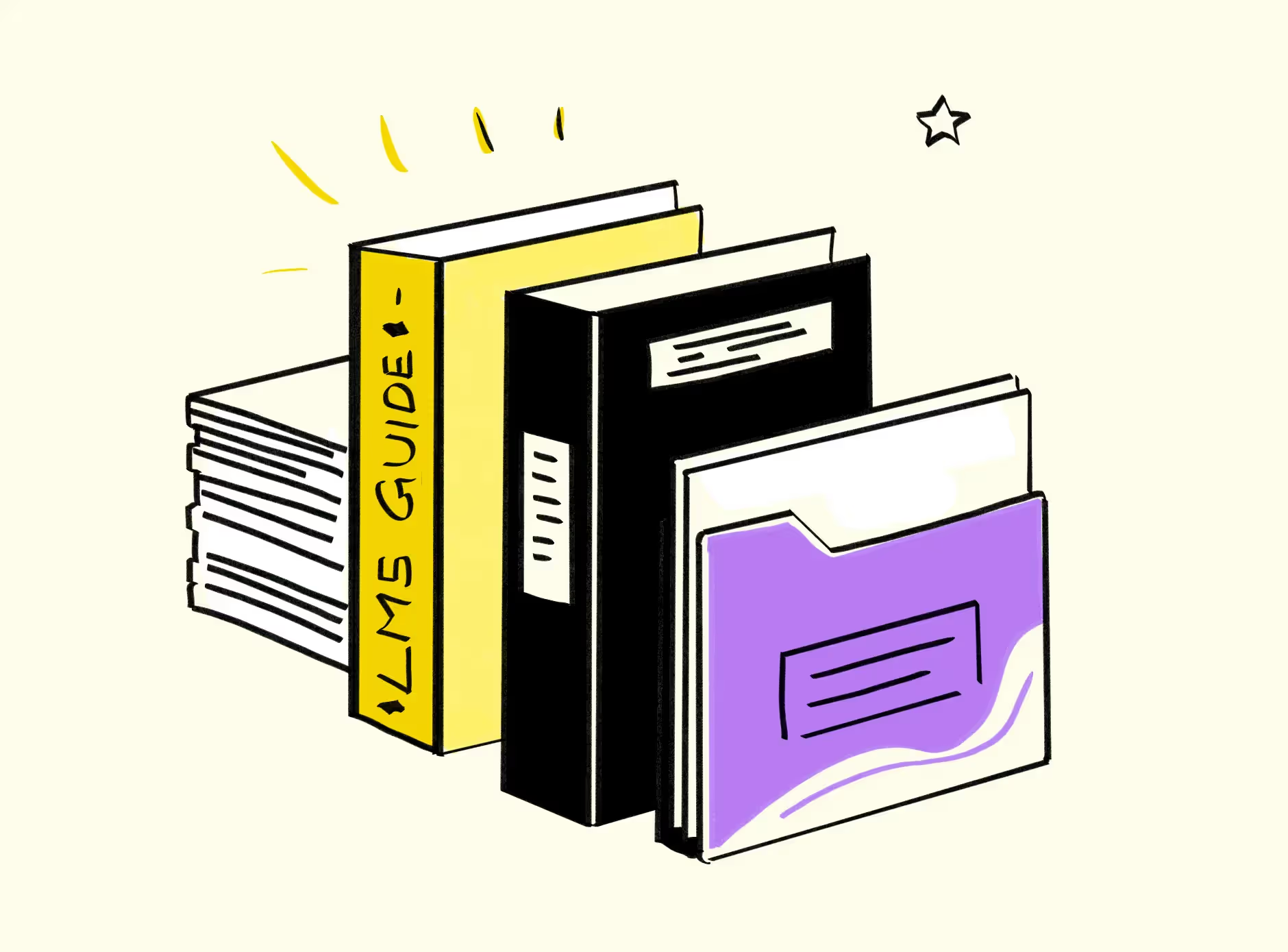![8 Must Have LMS Security Features & Best Practices [2025]](https://cdn.prod.website-files.com/62f0b227e38c6d799afcd8ba/673c5c61d330380036fb4f10_6675489a7ab394774d404b22_LMS_data_Protection-min.avif)
![8 Must Have LMS Security Features & Best Practices [2025]](https://cdn.prod.website-files.com/62d6876535c5c7559909754c/67c036910fbf3721b5778e27_Attendance_Zoom-min%201.png)

Key Takeaways
- Prioritizing data security in LMS platforms protects sensitive information and builds trust among users.
- Essential LMS security features include encryption, multi-factor authentication, and role-based access control.
- Compliance with privacy regulations like GDPR ensures data protection and reinforces ethical data handling.
In the digital age, where online education continues to soar, data security in Learning Management Systems (LMS) has never been more critical. With more students and educators moving to online platforms, LMS security isn’t just about compliance but a cornerstone of trust and operational efficiency. Data breaches can compromise sensitive information, from student records to financial data, impacting an institution’s reputation and functionality.
This guide covers essential LMS data security features and best practices every educational institution should know to ensure a safe, reliable, and secure online learning environment.
Why Data Security in LMS Platforms is Important
As the education industry embraces digital platforms, data breaches in LMS platforms pose a significant threat. When an LMS handles student information, financial details, academic records, and more, the responsibility for data protection becomes paramount.
Implementing strong security measures fosters trust among students and educators, ensuring data confidentiality and compliance with privacy regulations. The secure handling of data is crucial to maintaining the integrity of an institution’s reputation, fostering a positive learning experience, and protecting all users from cyber threats.
Proactively protecting student data not only guards against breaches but also builds a foundation of trust in digital learning environments, which is essential for institutions aiming to provide safe, reliable education.
Learning Management System (LMS) Security Features for Data Protection
Below are the eight essential LMS data security features to prioritize for robust data protection and user confidence.
1. Data Encryption
What it is:
Data encryption converts sensitive information into unreadable code that can only be accessed by authorized users. This ensures that data remains confidential and secure from unauthorized access.
Why it’s important in LMS:
In an LMS, data encryption is vital to protect student information, academic records, and login credentials from interception and breaches. Since LMS platforms handle personal and educational data, encryption ensures secure communication channels and maintains data integrity, building trust within the platform.
How EdisonOS covers this:
EdisonOS employs advanced encryption protocols like AES to secure all user data in transit and at rest, ensuring that any information shared on the platform is protected from unauthorized access. This commitment to encryption upholds the platform’s reputation for robust data security.
2. Regular Backups and Data Recovery Plans
What it is:
Regular backups involve copying data periodically to prevent data loss, while a data recovery plan ensures information can be restored if a system failure or cyber attack occurs.
Why it’s important in LMS:
For LMS platforms, routine backups and disaster recovery plans safeguard valuable data, such as course materials and student progress reports. With these protocols in place, institutions can quickly restore lost data, minimizing disruptions to the learning experience.
How EdisonOS covers this:
EdisonOS automates backups and securely stores data both on-site and off-site, reducing the risk of data loss. The platform’s disaster recovery plan allows for swift restoration, ensuring continuity for students and educators even during unexpected system interruptions.
3. Password Authentication
What it is:
Password authentication is a security process that uses strong passwords to verify users before granting access to their accounts or sensitive data.
Why it’s important in LMS:
In an LMS, password authentication is crucial for securing user accounts. A strong password policy prevents unauthorized access to student records and other confidential information, fortifying the LMS’s defenses against potential intrusions.
How EdisonOS covers this:
EdisonOS enforces robust password policies with complex requirements and periodic updates, ensuring that only authorized users can access the platform. This measure adds a layer of security to prevent unauthorized logins and data breaches.
4. Multi-Factor Authentication (MFA)
What it is:
Multi-factor authentication (MFA) adds an extra security layer by requiring two or more verification methods for login, such as a password plus an SMS code or biometric scan.
Why it’s important in LMS:
MFA significantly reduces the likelihood of unauthorized access in an LMS. Even if a password is compromised, MFA’s additional verification steps make it nearly impossible for attackers to breach user accounts, offering a critical safeguard for sensitive educational data.
How EdisonOS covers this:
EdisonOS integrates MFA by allowing multiple verification steps, such as SMS codes and security questions, to authenticate users. This enhances security by ensuring only verified users can access sensitive information on the platform.
5. Single Sign-On (SSO)
What it is:
Single Sign-On (SSO) enables users to access multiple applications with one set of credentials, reducing the need for repeated logins and streamlining access across platforms.
Why it’s important in LMS:
SSO enhances the user experience by simplifying access while also increasing security by centralizing authentication. For institutions using multiple platforms, SSO reduces password fatigue and potential risks associated with multiple logins.
How EdisonOS covers this:
EdisonOS offers SSO functionality, allowing users to access the platform seamlessly with their institution’s single login credentials. This approach not only improves convenience but also enhances security through centralized authentication.
6. User Access Roles
What it is:
User access roles involve assigning specific permissions based on job functions or roles, such as administrators, teachers, and students, to limit data access accordingly.
Why it’s important in LMS:
Defining access roles in an LMS protects sensitive data by ensuring that users can only access information pertinent to their responsibilities. This reduces the risk of accidental data exposure or unauthorized access to restricted areas.
How EdisonOS covers this:
EdisonOS utilizes Role-Based Access Control (RBAC), enabling administrators to set permissions based on specific roles. This granular control ensures that sensitive data remains accessible only to authorized personnel, enhancing data security across the platform.
7. Anti-Spam & Malware Protection
What it is:
Anti-spam and malware protection involve using software and protocols to detect and prevent malicious attacks, including phishing attempts and harmful downloads.
Why it’s important in LMS:
An LMS with anti-spam and malware protection safeguards users from malicious threats that could compromise data. Spam filters, malware scans, and email security protocols help prevent attacks that may lead to data breaches.
How EdisonOS covers this:
EdisonOS implements advanced anti-spam filters and malware detection software to protect users from harmful attacks. Regular scans and secure email practices ensure the platform remains a safe environment for students and educators.
8. GDPR Compliance
What it is:
GDPR compliance means adhering to the General Data Protection Regulation, a data privacy standard that governs the responsible management and protection of personal data in the EU.
Why it’s important in LMS:
GDPR compliance in an LMS ensures the responsible handling of user data, protecting students’ and educators’ personal information. Compliance also demonstrates the institution’s commitment to privacy and reduces the risk of legal penalties.
How EdisonOS covers this:
EdisonOS follows GDPR guidelines by implementing strict data management policies, offering transparency on data collection, and respecting user rights. This compliance helps ensure that personal data is handled securely and ethically, fostering user trust.
Best Practices to Secure Your Learning Management System (LMS)
As educational institutions increasingly adopt digital platforms, securing LMS platforms becomes essential for protecting user data and ensuring safe online environments. Here are some best practices that every institution should consider implementing to enhance LMS security:
- Implement Data Encryption: Encrypting data both in transit and at rest is essential for protecting sensitive information. By ensuring that only authorized users can access this data, encryption guards against unauthorized interception.
- Establish Regular Backup and Recovery Plans: Routine data backups and a strong disaster recovery plan allow institutions to restore essential information quickly if data loss occurs, ensuring learning continuity.
- Enforce Strong Password Authentication: Password complexity requirements and periodic updates can greatly reduce the risk of unauthorized access to accounts.
- Utilize Multi-Factor Authentication (MFA): Adding an extra layer of authentication (like SMS codes or biometrics) can prevent unauthorized access, even if a password is compromised.
- Enable Single Sign-On (SSO): Simplifying access with SSO enhances convenience and reduces login fatigue while maintaining high security through centralized authentication protocols.
- Define User Access Roles: Assigning specific permissions based on user roles minimizes data exposure, ensuring users only access information necessary for their roles.
- Integrate Anti-Spam & Malware Protection: Protecting the platform from spam, phishing, and malware prevents malicious threats that could compromise data integrity.
- Ensure GDPR Compliance: Complying with data privacy standards like GDPR is critical for protecting user data and avoiding legal repercussions, especially for institutions with users in the EU.
By integrating these practices, institutions can create a safe and trustworthy LMS environment that fosters learning without compromising data security.
How EdisonOS Secures Its LMS & Why It’s the Best
EdisonOS stands out as a leading LMS for its advanced, comprehensive approach to data security, incorporating all of the essential best practices and beyond to protect students, educators, and institutions alike.
- Advanced Encryption Protocols: EdisonOS prioritizes data security by employing robust encryption protocols that protect data both at rest and in transit, ensuring no unauthorized user can access sensitive information.
- Automated Backups and Resilient Recovery Plans: EdisonOS offers automated backup solutions with secure storage both on-site and off-site, along with a reliable disaster recovery plan, ensuring that data can be quickly restored if necessary.
- Strong Authentication Policies: With enforced password complexity, MFA, and SSO, EdisonOS secures user accounts from unauthorized access. MFA adds an additional layer of protection, and SSO enhances user convenience without compromising security.
- Granular Role-Based Access Control: EdisonOS’s Role-Based Access Control (RBAC) assigns permissions based on user roles, such as administrators, teachers, and students. This role-specific access minimizes the risk of data exposure and helps administrators maintain control over sensitive information.
- Comprehensive Anti-Spam and Malware Protection: EdisonOS integrates advanced anti-spam and malware protection systems, providing users with a safe environment free from phishing and other malicious threats.
- Full GDPR Compliance: With a commitment to responsible data management, EdisonOS ensures full compliance with GDPR, offering transparency and respecting user rights for data protection.
Through these layered security measures, EdisonOS offers an LMS experience that is as secure as it is user-friendly, making it an ideal choice for institutions focused on providing safe, reliable online learning. The platform’s dedication to best practices and proactive security measures confirms why EdisonOS is one of the best LMS solutions available for institutions prioritizing data security and privacy.
Conclusion
In an increasingly digital educational landscape, safeguarding user data within Learning Management Systems is essential. From data encryption and multi-factor authentication to compliance with privacy regulations, implementing robust LMS security practices protects both institutions and their users, fostering a trustworthy and effective learning environment.
EdisonOS exemplifies these standards, offering a secure, reliable LMS that seamlessly integrates industry-leading security features. By prioritizing advanced encryption, resilient backup systems, role-based access controls, and comprehensive compliance with data privacy laws, EdisonOS empowers institutions to focus on learning without compromising on data protection.
Choosing a secure LMS like EdisonOS not only ensures regulatory compliance but also builds trust with students and educators, creating a foundation for safe, future-ready online education. Embracing these security practices today paves the way for a protected, progressive, and successful digital learning journey.
Tutors Edge by EdisonOS
in our newsletter, curated to help tutors stay ahead!
Tutors Edge by EdisonOS
Get Exclusive test insights and updates in our newsletter, curated to help tutors stay ahead!
Recommended Reads
Recommended Podcasts












.png)
.webp)
